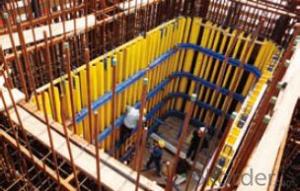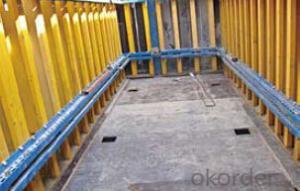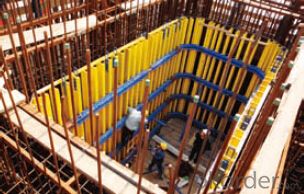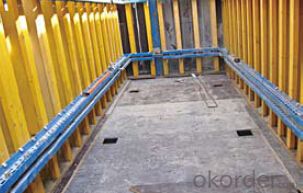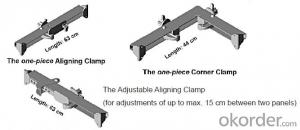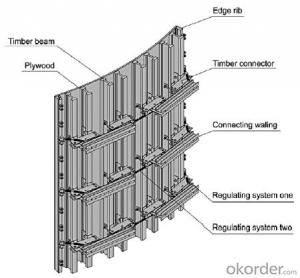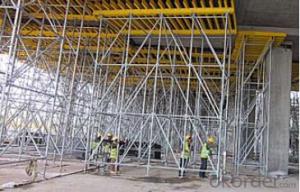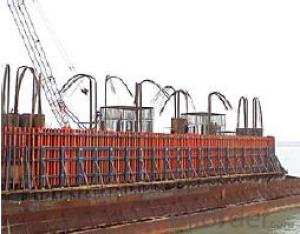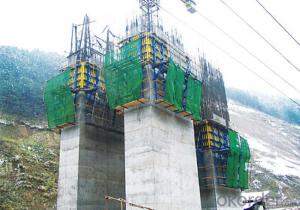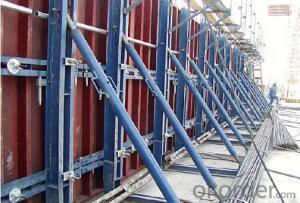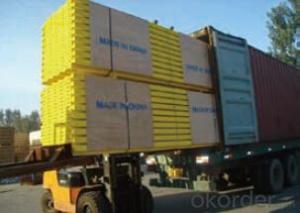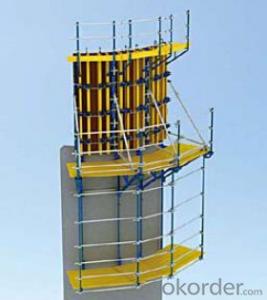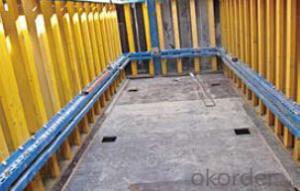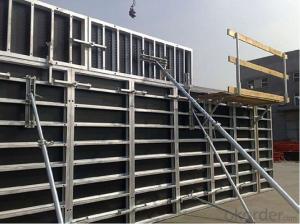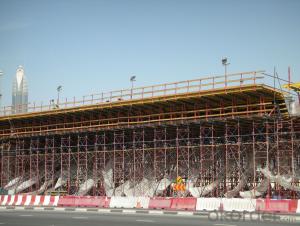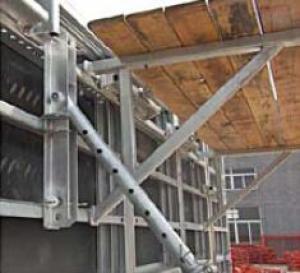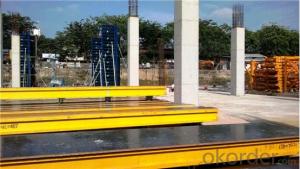Shaft-platform system for Formwork and Scaffolding
- Loading Port:
- Tianjin
- Payment Terms:
- TT OR LC
- Min Order Qty:
- 50 m²
- Supply Capability:
- 1000 m²/month
OKorder Service Pledge
Quality Product, Order Online Tracking, Timely Delivery
OKorder Financial Service
Credit Rating, Credit Services, Credit Purchasing
You Might Also Like
Shaft Platform
As operating platform, the shaft platform is mainly used in the concrete pouring of elevator shaft,
equipment shaft, stair shaft of high-rise building and so on.
Characteristics:
◆ The length of shaft beam is adjustable.
◆ Flexible structure makes lifting easier.
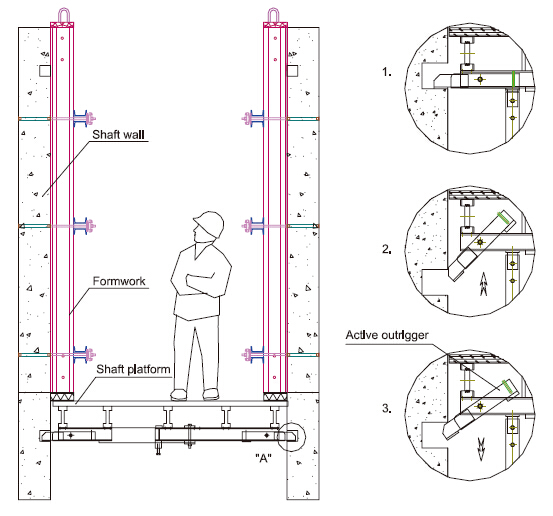
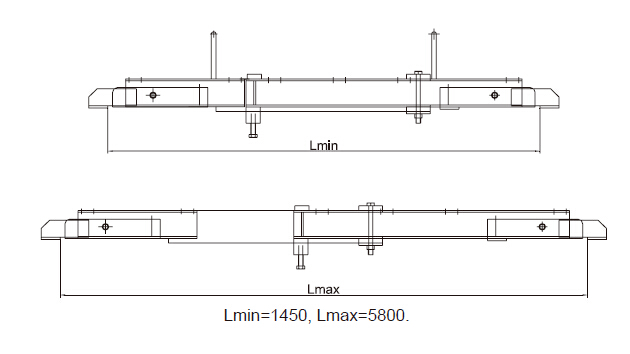
- Q: Can steel formwork be used for projects with stringent quality requirements?
- Yes, steel formwork can definitely be used for projects with stringent quality requirements. Steel formwork is known for its durability, strength, and consistency, making it an ideal choice for projects where precision, accuracy, and high-quality finishes are essential. Steel formwork is capable of withstanding heavy loads and can maintain its shape and dimensions over multiple uses, ensuring that the concrete structure is formed accurately and precisely according to the design specifications. Additionally, steel formwork provides a smooth surface finish, reducing the need for extensive post-construction finishing work. Its robustness and stability make it suitable for projects requiring stringent quality control, such as high-rise buildings, bridges, and infrastructure projects. Furthermore, steel formwork allows for easy customization, enabling contractors to meet specific project requirements efficiently. Overall, steel formwork is a reliable and efficient choice for projects with stringent quality requirements, ensuring that the final structure meets the highest standards of quality and durability.
- Q: Can steel formwork be used for both small and large-scale construction projects?
- Indeed, steel formwork proves to be applicable for construction projects of both small and large scales. It presents numerous advantages, including durability, reusability, and flexibility. Its ability to endure immense pressure and loads renders it suitable for extensive projects necessitating substantial concrete pouring. Moreover, the modular nature of steel formwork permits effortless customization and adaptation to diverse project sizes and designs. This characteristic renders it equally fit for smaller construction projects that require a swift and effective formwork system. Additionally, steel formwork guarantees a polished and superior finish to concrete structures, ensuring a uniform appearance irrespective of the project magnitude. All in all, steel formwork emerges as a versatile and dependable option for construction projects, be they small or large in scale.
- Q: What are the different finishes available for steel formwork?
- Some of the different finishes available for steel formwork include smooth, textured, brushed, and galvanized finishes. Each finish serves a specific purpose and can be chosen based on the desired appearance, durability, and functionality of the steel formwork.
- Q: Are there any environmental considerations when using steel formwork?
- Using steel formwork in construction projects raises several environmental considerations. First and foremost, the production of steel leaves a significant carbon footprint. Greenhouse gas emissions are generated during the extraction and processing of raw materials, such as iron ore and coal. Moreover, the manufacturing process itself requires a substantial amount of energy, further contributing to carbon emissions. In addition, the transportation of steel formwork systems has a negative environmental impact. The movement of heavy steel panels and other components increases fuel consumption and emissions, particularly for long distances. Furthermore, steel formwork is typically non-renewable and non-recyclable. Once it reaches the end of its useful life, it often ends up in landfills, contributing to waste accumulation and environmental pollution. However, it is important to note that steel formwork does have some environmental advantages compared to other materials. For instance, it can be reused multiple times, reducing the need for new materials and minimizing waste generation. Its durability and strength also contribute to a longer lifespan and less frequent replacements, which in turn reduces overall resource consumption. To mitigate the environmental impact of using steel formwork, various measures can be taken. These include optimizing transportation routes to reduce fuel consumption, implementing energy-efficient manufacturing processes, and promoting the recycling of steel formwork components at the end of their life. Additionally, exploring alternative formwork materials, such as recycled or sustainable options, can also help address the environmental considerations associated with steel formwork usage.
- Q: Can steel formwork be used in retail or commercial construction projects?
- Yes, steel formwork can be used in retail or commercial construction projects. Steel formwork offers various advantages such as durability, reusability, and high load-bearing capacity, making it suitable for large-scale projects like retail or commercial buildings. Additionally, steel formwork allows for faster construction and better quality finishes, further enhancing its suitability for these types of projects.
- Q: What are the common design considerations for steel formwork in hot climates?
- Some common design considerations for steel formwork in hot climates include selecting materials with high heat resistance, incorporating proper ventilation and shading to minimize heat buildup, ensuring adequate structural support to withstand thermal expansion, and implementing effective methods for concrete curing to prevent cracking due to rapid drying. Additionally, attention should be given to the durability and maintenance of the formwork system to withstand the harsh conditions and frequent use in hot climates.
- Q: What are the different types of coatings available for steel formwork panels?
- Steel formwork panels can be coated in various ways, each with its own advantages and uses. 1. Galvanized Coating: This type of coating is commonly used and involves applying a layer of zinc to the steel surface through galvanization. Galvanized coatings offer excellent resistance to corrosion, making them suitable for outdoor and high-moisture environments. 2. Epoxy Coating: Known for their exceptional chemical and abrasion resistance, epoxy coatings consist of resin and a hardener. They create a strong and durable surface that can withstand heavy use and exposure to chemicals, making them ideal for industrial settings or applications requiring high performance. 3. Polyurethane Coating: Polyurethane coatings are highly durable and provide excellent resistance to abrasion, impact, and weathering. They are commonly used in construction projects or infrastructure development where durability is essential. These coatings also adhere well to the steel surface, ensuring long-lasting protection. 4. Powder Coating: In this dry finishing process, a fine powder is electrostatically applied to the steel surface and then heat-cured to form a hard, protective layer. Powder coatings come in a variety of colors and offer excellent resistance to chipping, scratching, and fading. They are often used for aesthetic purposes or when a decorative finish is desired. 5. Zinc-rich Coating: Similar to galvanized coatings, zinc-rich coatings have a higher concentration of zinc particles. These coatings provide enhanced corrosion protection and are commonly used in highly corrosive environments such as marine or coastal areas. They can be applied through spraying or brushing. 6. Fire-resistant Coating: Specifically designed to prevent the spread of fire, fire-resistant coatings create a barrier that delays the heating of steel during a fire, reducing the risk of structural collapse. They are commonly used in commercial and industrial buildings, as well as in infrastructure projects. To ensure the best coating for steel formwork panels, it is important to consider the project's requirements and consult with experts. Factors such as the environment, expected durability, and budget should be taken into account to ensure optimal performance and longevity.
- Q: Can steel formwork be easily repaired in case of damage?
- Yes, steel formwork can be easily repaired in case of damage. Steel is a durable and malleable material, allowing for straightforward repairs such as welding, patching, or replacing damaged sections. Additionally, its strength and resilience make it less prone to damage compared to other formwork materials like wood or plastic.
- Q: How does steel formwork handle different types of concrete mixes?
- Steel formwork is highly versatile and can handle different types of concrete mixes effectively. Its strength and durability make it suitable for various concrete compositions, including lightweight, normal, or high-strength mixes. Steel formwork provides a rigid structure that can withstand the pressure exerted by the concrete during pouring and setting. Additionally, its smooth surface allows for easy removal and produces a high-quality finish on the concrete surface. Overall, steel formwork is a reliable choice for accommodating different types of concrete mixes in construction projects.
- Q: Can steel formwork be used for staircase construction?
- Indeed, steel formwork is perfectly suitable for the construction of staircases. This versatile and resilient material is frequently employed in construction ventures, including staircase construction. It furnishes a robust and secure framework for pouring concrete and guarantees the meticulous and precise formation of the staircase. Moreover, steel formwork can be reused, rendering it a cost-effective option for repetitive construction procedures such as staircase construction. Furthermore, it offers adaptability in terms of design, enabling the creation of diverse staircase shapes and dimensions. In summary, steel formwork is an ideal selection for staircase construction due to its potency, durability, reusability, and design flexibility.
Send your message to us
Shaft-platform system for Formwork and Scaffolding
- Loading Port:
- Tianjin
- Payment Terms:
- TT OR LC
- Min Order Qty:
- 50 m²
- Supply Capability:
- 1000 m²/month
OKorder Service Pledge
Quality Product, Order Online Tracking, Timely Delivery
OKorder Financial Service
Credit Rating, Credit Services, Credit Purchasing
Similar products
Hot products
Hot Searches
Related keywords
